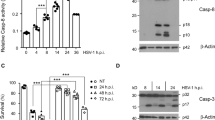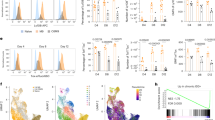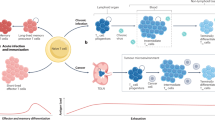Abstract
Autophagy is implicated in regulating cell death in activated T cells, but the underlying mechanism is unclear. Here, we show that inhibition of autophagy via Beclin 1 gene deletion in T cells leads to rampant apoptosis in these cells upon TCR stimulation. Beclin 1-deficient mice fail to mount autoreactive T-cell responses and are resistant to experimental autoimmune encephalomyelitis. Compared with Th17 cells, Th1 cells are much more susceptible to cell death upon Beclin 1 deletion. Cell death proteins are highly increased in Beclin 1-deficient T cells and inhibition of caspases and genetic deletion of Bim reverse apoptosis. In addition, p62/sequestosome 1 binds to caspase-8 but does not control levels of procaspase-8 or other cell death-related proteins. These results establish a direct role of autophagy in inhibiting the programmed cell death through degradation of apoptosis proteins in activated T cells.
Similar content being viewed by others
Log in or create a free account to read this content
Gain free access to this article, as well as selected content from this journal and more on nature.com
or
Abbreviations
- EAE:
-
experimental autoimmune encephalomyelitis
- sqstm1:
-
sequestosome 1
- ATG:
-
autophagy-related gene
- TUNEL:
-
terminal transferase dUTP nick-end labeling
- MOG:
-
myelin oligodendrocyte glycoprotein
References
Cuervo AM . Autophagy: many paths to the same end. Mol Cell Biochem 2004; 263: 55–72.
Levine B, Klionsky DJ . Development by self-digestion: molecular mechanisms and biological functions of autophagy. Dev Cell 2004; 6: 463–477.
Shintani T, Klionsky DJ . Autophagy in health and disease: a double-edged sword. Science 2004; 306: 990–995.
Mizushima N, Klionsky DJ . Protein turnover via autophagy: implications for metabolism. Annu Rev Nutr 2007; 27: 19–40.
Klionsky DJ . The molecular machinery of autophagy: unanswered questions. J Cell Sci 2005; 118 (Part 1): 7–18.
Suzuki K, Ohsumi Y . Molecular machinery of autophagosome formation in yeast, Saccharomyces cerevisiae. FEBS Lett 2007; 581: 2156–2161.
Liang XH, Kleeman LK, Jiang HH, Gordon G, Goldman JE, Berry G et al. Protection against fatal Sindbis virus encephalitis by beclin, a novel Bcl-2-interacting protein. J Virol 1998; 72: 8586–8596.
Liang XH, Jackson S, Seaman M, Brown K, Kempkes B, Hibshoosh H et al. Induction of autophagy and inhibition of tumorigenesis by beclin 1. Nature 1999; 402: 672–676.
Kihara A, Noda T, Ishihara N, Ohsumi Y . Two distinct Vps34 phosphatidylinositol 3-kinase complexes function in autophagy and carboxypeptidase Y sorting in Saccharomyces cerevisiae. J Cell Biol 2001; 152: 519–530.
Zhong Y, Wang QJ, Li X, Yan Y, Backer JM, Chait BT et al. Distinct regulation of autophagic activity by Atg14L and Rubicon associated with Beclin 1-phosphatidylinositol-3-kinase complex. Nat Cell Biol 2009; 11: 468–476.
Matsunaga K, Saitoh T, Tabata K, Omori H, Satoh T, Kurotori N et al. Two Beclin 1-binding proteins, Atg14L and Rubicon, reciprocally regulate autophagy at different stages. Nat Cell Biol 2009; 11: 385–396.
Espert L, Denizot M, Grimaldi M, Robert-Hebmann V, Gay B, Varbanov M et al. Autophagy is involved in T cell death after binding of HIV-1 envelope proteins to CXCR4. J Clin Invest 2006; 116: 2161–2172.
Li C, Capan E, Zhao Y, Zhao J, Stolz D, Watkins SC et al. Autophagy is induced in CD4+ T cells and important for the growth factor-withdrawal cell death. J Immunol 2006; 177: 5163–5168.
Feng CG, Zheng L, Jankovic D, Bafica A, Cannons JL, Watford WT et al. The immunity-related GTPase Irgm1 promotes the expansion of activated CD4+ T cell populations by preventing interferon-gamma-induced cell death. Nat Immunol 2008; 9: 1279–1287.
Bell BD, Leverrier S, Weist BM, Newton RH, Arechiga AF, Luhrs KA et al. FADD and caspase-8 control the outcome of autophagic signaling in proliferating T cells. Proc Natl Acad Sci USA 2008; 105: 16677–16682.
Pua HH, Dzhagalov I, Chuck M, Mizushima N, He YW . A critical role for the autophagy gene Atg5 in T cell survival and proliferation. J Exp Med 2007; 204: 25–31.
Stephenson LM, Miller BC, Ng A, Eisenberg J, Zhao Z, Cadwell K et al. Identification of Atg5-dependent transcriptional changes and increases in mitochondrial mass in Atg5-deficient T lymphocytes. Autophagy 2009; 5: 625–635.
Pua HH, Guo J, Komatsu M, He YW . Autophagy is essential for mitochondrial clearance in mature T lymphocytes. J Immunol 2009; 182: 4046–4055.
Kirkin V, McEwan DG, Novak I, Dikic I . A role for ubiquitin in selective autophagy. Mol Cell 2009; 34: 259–269.
Moscat J, Diaz-Meco MT . p62 at the crossroads of autophagy, apoptosis, and cancer. Cell 2009; 137: 1001–1004.
Tait SW, Green DR . Caspase-independent cell death: leaving the set without the final cut. Oncogene 2008; 27: 6452–6461.
Jaattela M, Tschopp J . Caspase-independent cell death in T lymphocytes. Nat Immunol 2003; 4: 416–423.
Degterev A, Huang Z, Boyce M, Li Y, Jagtap P, Mizushima N et al. Chemical inhibitor of nonapoptotic cell death with therapeutic potential for ischemic brain injury. Nat Chem Biol 2005; 1: 112–119.
Weant AE, Michalek RD, Khan IU, Holbrook BC, Willingham MC, Grayson JM . Apoptosis regulators Bim and Fas function concurrently to control autoimmunity and CD8+ T cell contraction. Immunity 2008; 28: 218–230.
Hutcheson J, Scatizzi JC, Siddiqui AM, Haines 3rd GK, Wu T, Li QZ et al. Combined deficiency of proapoptotic regulators Bim and Fas results in the early onset of systemic autoimmunity. Immunity 2008; 28: 206–217.
Hughes PD, Belz GT, Fortner KA, Budd RC, Strasser A, Bouillet P . Apoptosis regulators Fas and Bim cooperate in shutdown of chronic immune responses and prevention of autoimmunity. Immunity 2008; 28: 197–205.
Green DR . Fas Bim boom! Immunity 2008; 28: 141–143.
Hildeman DA, Zhu Y, Mitchell TC, Bouillet P, Strasser A, Kappler J et al. Activated T cell death in vivo mediated by proapoptotic bcl-2 family member bim. Immunity 2002; 16: 759–767.
Boatright KM, Renatus M, Scott FL, Sperandio S, Shin H, Pedersen IM et al. A unified model for apical caspase activation. Mol Cell 2003; 11: 529–541.
Jin Z, Li Y, Pitti R, Lawrence D, Pham VC, Lill JR et al. Cullin3-based polyubiquitination and p62-dependent aggregation of caspase-8 mediate extrinsic apoptosis signaling. Cell 2009; 137: 721–735.
Pankiv S, Clausen TH, Lamark T, Brech A, Bruun JA, Outzen H et al. p62/SQSTM1 binds directly to Atg8/LC3 to facilitate degradation of ubiquitinated protein aggregates by autophagy. J Biol Chem 2007; 282: 24131–24145.
Choi YE, Butterworth M, Malladi S, Duckett CS, Cohen GM, Bratton SB . The E3 ubiquitin ligase cIAP1 binds and ubiquitinates caspase-3 and -7 via unique mechanisms at distinct steps in their processing. J Biol Chem 2009; 284: 12772–12782.
Zhang X, Brunner T, Carter L, Dutton RW, Rogers P, Bradley L et al. Unequal death in T helper cell (Th)1 and Th2 effectors: Th1, but not Th2, effectors undergo rapid Fas/FasL-mediated apoptosis. J Exp Med 1997; 185: 1837–1849.
Kischkel FC, Hellbardt S, Behrmann I, Germer M, Pawlita M, Krammer PH et al. Cytotoxicity-dependent APO-1 (Fas/CD95)-associated proteins form a death-inducing signaling complex (DISC) with the receptor. Embo J 1995; 14: 5579–5588.
Jia W, He YW . Temporal regulation of intracellular organelle homeostasis in T lymphocytes by autophagy. J Immunol 2011; 18: 18.
Arsov I, Adebayo A, Kucerova-Levisohn M, Haye J, MacNeil M, Papavasiliou FN et al. A role for autophagic protein Beclin 1 early in lymphocyte development. J Immunol 2011; 186: 2201–2209.
Lum JJ, Bauer DE, Kong M, Harris MH, Li C, Lindsten T et al. Growth factor regulation of autophagy and cell survival in the absence of apoptosis. Cell 2005; 120: 237–248.
Gal J, Strom AL, Kwinter DM, Kilty R, Zhang J, Shi P et al. Sequestosome 1/p62 links familial ALS mutant SOD1 to LC3 via an ubiquitin-independent mechanism. J Neurochem 2009; 111: 1062–1073.
Acknowledgements
We thank Drs. Penny Morel and Lisa Borghesi for critical reading, and Ms Christen Shiber for technical assistance. This work is partly supported by National Institutes of Health (NIH) Grant AI063496 to BL and a pilot grant of Cancer and Aging Program (NIH Grant no. P20 CA103730) to BL. JRK is supported by NIH training Grant T32 CA082084. This work is also partly supported by NSFC grants 30528008 (to B Lu and X Zhang). QY and XC are supported by Eleven-Fifth Mega-Scientific Project on ‘prevention and treatment of AIDS, viral hepatitis and other infectious diseases’ (2008ZX10003-012). GL is supported by a scholarship from China Scholarship council # 2010692006.
Author information
Authors and Affiliations
Corresponding author
Ethics declarations
Competing interests
The authors declare no conflict of interest.
Additional information
Edited by H-U Simon
Author Contributions
JRK and BL designed and performed the experiments and prepared the manuscript. CL and SJ generated the conditional knockout mice. IGG and QY performed experiments and analyzed results.
Supplementary Information accompanies the paper on Cell Death and Differentiation website
Supplementary information
Rights and permissions
About this article
Cite this article
Kovacs, J., Li, C., Yang, Q. et al. Autophagy promotes T-cell survival through degradation of proteins of the cell death machinery. Cell Death Differ 19, 144–152 (2012). https://doi.org/10.1038/cdd.2011.78
Received:
Revised:
Accepted:
Published:
Issue date:
DOI: https://doi.org/10.1038/cdd.2011.78
Keywords
This article is cited by
-
Immunomodulatory effects of umbilical mesenchymal stem cell-derived exosomes on CD4+ T cells in patients with primary Sjögren's syndrome
Inflammopharmacology (2023)
-
Induction of autophagy-dependent ferroptosis to eliminate drug-tolerant human retinoblastoma cells
Cell Death & Disease (2022)
-
The relationship between autophagy and the immune system and its applications for tumor immunotherapy
Molecular Cancer (2019)
-
Autophagy: roles in intestinal mucosal homeostasis and inflammation
Journal of Biomedical Science (2019)
-
The physiology of foamy phagocytes in multiple sclerosis
Acta Neuropathologica Communications (2018)



